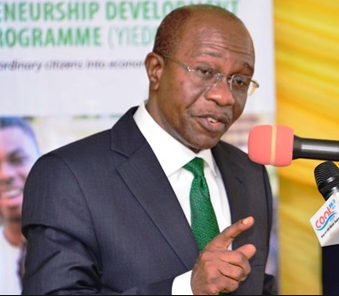
The National Cashew Association of Nigeria (NCAN) has lamented delays in validating the Nigerian Export Proceeds (NXP) number recently introduced by the Central Bank of Nigeria (CBN), due to inefficiencies and bureaucracies of agencies involved, thereby creating a backlog of uncleared export containers at the port.
The NXP is a mandatory document to be completed by all exporters through authorised dealer banks for shipment of goods outside Nigeria irrespective of the value and whether or not payment is involved.
The validation process involves the banks, key inspection agencies, Nigeria Customs Service and the CBN.
Speaking with SHIPS & PORTS, Secretary General of the association, Sotonye Anga, said it now takes an average of 30 days to process their produce from the port as a result of the delay.
Anga called on the CBN to reconsider its stand on the policy, which he described as a great disincentive to exporters of agricultural produce.
According to him, the policy is not in the best interest of exporters and the diversification of the nation’s economy, noting that if not reversed, it would lead to sharp drop in export of agricultural commodities.
He said, “What CBN has now introduced is the NXP validation. CBN in its wisdom is doing this to ensure export proceeds are repatriated in the country and monitor transactions, but there are other ways to do this. Right now, the way the CBN is going about it with too many agencies involved in the validation process is sending a lot of confused signals.
“What is happening right now is that we have so many queues of export containers at the port. That is what has prevented our containers from going for over a month. What should an export container be doing at the port for over a month? Too many agencies are involved in the validation process. It is not feasible for agricultural commodities because our goods are perishable and a lot of these agencies involved in the validation process lack the capacity to handle this kind of process.
“Because of the long queues of containers, we face the risk of theft, people can break into the containers and steal your goods, we also face the problem of deterioration because the products are already loaded in the container and we have expected that in 40days they should arrive destination but it is going to spend one month at the port because of these issues.
“When vessels come into the port to carry goods, they end up leaving without carrying the goods. So the exporters are losing, the nation is also losing. The kind of losses that exporters are going to face as a result of deterioration of product quality, theft and inefficiencies is going to be huge because of demurrage and additional charges that would accumulate and give rise to increased bank charges.
“These delays will cause a serious decrease in our export capacities. Because of this singular policy, we are going to see a sharp drop in export of agricultural commodities. We appeal to the CBN to reconsider this decision. It is not in the best interest of Nigerian exporters and diversification of the economy.
“It is creating a serious backlog of export products and I know this is not what the policy is intending. The CBN Governor should come to the Apapa port and witness the huge backlog of containers there. The policy is frustrating exports, so it should be suspended. Implementing policies like this should take time, you don’t just bring them suddenly.”
Sotonye also listed the perennial gridlock in Apapa and poor support infrastructure as some of the challenges facing exporters.
“The gridlock has continued to delay transaction time and once you have a delay in transaction time, sometimes you may not be able to do your shipment on time and that could lead to default in contract and once that continues to happen, that is where blacklisting comes in. Overall, it is going to affect the diversification programme of the government. If we want to diversify the economy from oil, we have to ensure that our gateway allows for seamless vehicular movement.
“Government should fix this infrastructural decay and ensure that the road is built properly and transaction time enhanced. We are not just competing with Nigerians, we are competing with several other countries that produce the same commodities and they don’t have problems regarding port logistics difficulties and the gridlock we are experiencing on our roads. So, this is peculiar to Nigeria and this peculiarity is not good for business.
“We need to give export transaction priority because it is our export that will increase foreign earnings into the country. If we are not exporting, the burden on the naira will be too high,” he said.
